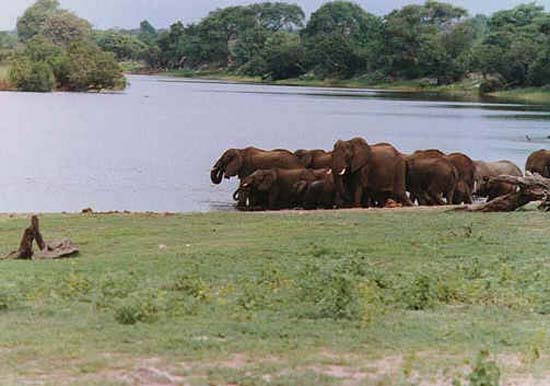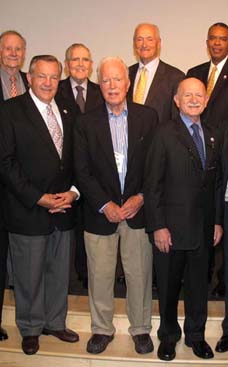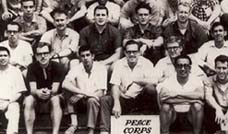
The first two months of Peace Corps service in Botswana are commonly referred to as "lockdown." That word can trigger images of prison doors closing with that a dull thud or volunteers roaming through villages with GPS ankle bracelets tracking their every move. The reality is that the first two months of service are a time when volunteers need to get to know their village, start meeting people, understand the culture and begin the immersion process as much as they can. At this point volunteers have already been in a village in their country for two to three months of Pre-Service Training, and lockdown is the first time they are on their own in the village they will call home for two years. It's called lockdown because a volunteer is supposed to stay in his/her village and not leave for any reason. The hope is to show communities that volunteers are committed to two years of working with people on a grassroots level. For me, lockdown was all about making connections. I have a huge passion for understanding how my brain works. As someone who has dealt with bipolar disorder, anger control issues and alcohol abuse, I have an almost vital need to trace the connections my brain makes. Every new experience can create a new link in the brain. Once that connection is used long enough it becomes more almost automatic. Adjusting to a new country, home and community can cause the brain to send more messages than a grounded "tween."
Botswana Peace Corps Volunteer Ross Szabo writes: Lockdown! First Two Months of Peace Corps Service
Lockdown! First Two Months of Peace Corps Service
Posted: 05/22/11 03:04 PM ET
Peace Corps has received some recent headlines for the Congressional Hearing about treatment of volunteers. As a currently serving volunteer, I am glad to see that Director Williams has apologized and is taking action to change the procedures that have hurt fellow volunteers in the past. I don't really have much to add to that conversation at this time. I started blogging for Huff Post this year because I felt it would be good to honor the 50th anniversary of Peace Corps by talking about what a volunteer experiences from the time he/she decides to join until he/she leaves. I am going to continue with that theme, but didn't want people to think I was ignoring what happened with the hearing.
The first two months of Peace Corps service in Botswana are commonly referred to as "lockdown." That word can trigger images of prison doors closing with that a dull thud or volunteers roaming through villages with GPS ankle bracelets tracking their every move. The reality is that the first two months of service are a time when volunteers need to get to know their village, start meeting people, understand the culture and begin the immersion process as much as they can.
At this point volunteers have already been in a village in their country for two to three months of Pre-Service Training, and lockdown is the first time they are on their own in the village they will call home for two years. It's called lockdown because a volunteer is supposed to stay in his/her village and not leave for any reason. The hope is to show communities that volunteers are committed to two years of working with people on a grassroots level.
For me, lockdown was all about making connections. I have a huge passion for understanding how my brain works. As someone who has dealt with bipolar disorder, anger control issues and alcohol abuse, I have an almost vital need to trace the connections my brain makes. Every new experience can create a new link in the brain. Once that connection is used long enough it becomes more almost automatic. Adjusting to a new country, home and community can cause the brain to send more messages than a grounded "tween."
I left my host family in my training village and looked forward to having my own home, eating the food I wanted and having privacy again. I knew I would miss the sweet 79-year-old woman who was taking care of me, but it was time to go. My wife and I moved into a small two-room house on a family compound that had four people living in the main house. Any time a person gets to a new home the brain has to make a lot of adjustments. Throw in moving into a new home in a middle income country like Botswana and that number increases significantly.
It was a sharp learning curve for me to wrap my head around some of the things I took for granted in the states. First, I had to learn what sounds were normal. I would lie awake for nights on end wondering if sounds I heard were a person trying to break into my house, a dog shaking the burglar bars again or a bird that sounds like someone with a jackhammer trying to rip open my tin roof. I attempted to use conventional cleaning methods until I figured out that my pocketknife really was the most effective tool for scrubbing the toilet and cleaning the stove. Then there is the joy of hand-washing clothes. The first couple times it was more like splashing around my bathtub like when I was a child with my rubber ducky, but eventually I developed a system. Other volunteers were dealing with pit latrines, being 2-3 hours away from the closest grocery store, a lack of water/electricity, and other changes like an outside door for every room in the house.
Another adjustment for me was learning how to cook. Unless you consider heating up a frozen pizza cooking, it's safe to say I didn't cook in the states. Living in Venice Beach I was much more into happy hours and restaurants. My wife and I bought all of the pots, pans, and weapons we needed to attack our "kitchen," which is actually just a stand alone stove/oven with a giant gas tank in one of the two rooms of our house. At first we struggled and made some basic rice, chicken or pasta dishes, but eventually the brain wiring advanced into full legitimate meals. After my brain adjusted to these simple things it was time to focus on the changes I was dealing with outside the home.
It's never easy being the new kid in school and there are some similar concerns when trying to fit in to a new neighborhood. A lot of people were interested in learning more about the only white people living in their area of the village. I did my best to get out of the house and say hello to my new neighbors. I got used to small children either excitedly skipping toward me or sprinting away from me in utter terror because of the color of my skin. I had some awkward moments where my Setswana wasn't good enough to carry a conversation, but for the most part I felt like people at least knew who I was. Connections made.
The last part of the adjustment is getting to know the community. Peace Corps requires all volunteers to do a community assessment. This assignment can be anywhere from two to 20 pages long. It's kind of like a scavenger hunt that had me checking off meetings with the village chief, police, NGOs, district council, stakeholders of the place where I work, and other fun information like drawing a map of how to get to my house. I joke about it now, but the community assessment did help me learn more about where I was and whom it would be helpful to know. It also helped people in the community become more connected to why I was in their village.
At the end of the two months, Peace Corps had all of the volunteers in my group meet for what we call In-Service Training. The meeting lasted two weeks. It covered technical parts for our first year of service and we developed a work plan for the first year at our sites. We got to reconnect with our friends and share similar stories of small successes, awkward moments and fears. Some volunteers were relieved that they could now leave their villages and see their friends. The training helped me feel better about the connections I was making in the physical and mental realms and left me thirsty for what was next.
















